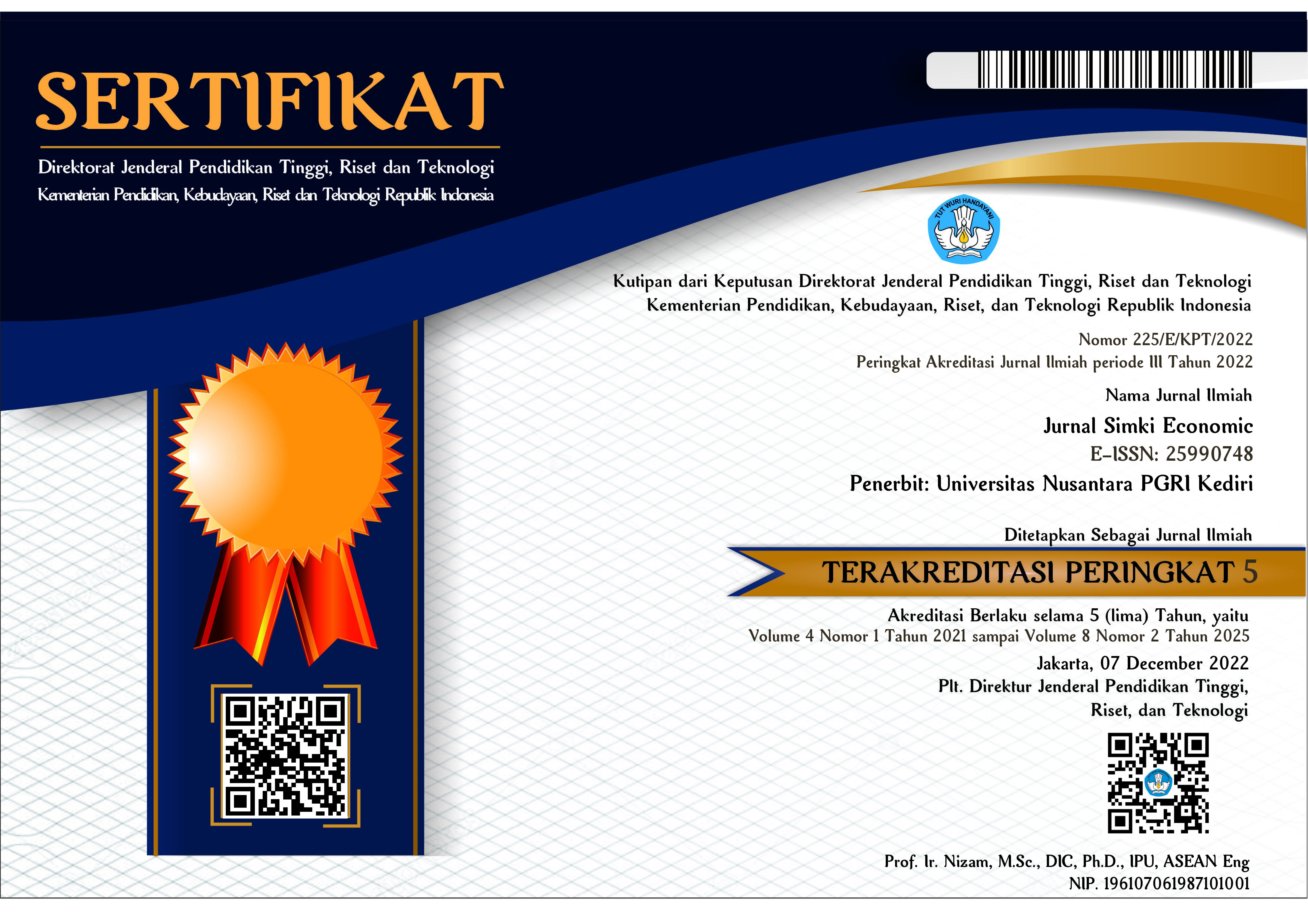Pengaruh Parental Income, Financial Literacy dan Locus of Control terhadap Financial Behavior Management Mahasiswa di Kota Jember
 Abstract views: 313
,
Abstract views: 313
,
 PDF (Bahasa Indonesia) downloads: 157
PDF (Bahasa Indonesia) downloads: 157
Abstract
Maintaining wise financial patterns among excessive spending habits can support financial health. Financial health is very important so that basic needs can be met properly through proper budget management. Understanding financial management is considered very important lately for individuals in managing income, monitoring expenses, investing, and planning finances for the future so that it affects their financial and social well-being. This study aims to gain an understanding of the influence of parental income, financial literacy, and locus of control on the management of financial behavior of students in Jember City. Data testing uses multiple linear regression. The sample taken consists of 180 students in Jember City. The sample was taken using probability sampling through the stratified random sampling method. The results of the study found that parental income, financial literacy, and locus of control positively and significantly affect financial management behavior, both individually and together.
Downloads
References
Afriani, R. I., & Kartika, R. (2021). Pengaruh Financial Knowledge dan Locus Control Terhadap Financial Management Behavior Mahasiswa Tingkat Akhir Jurusan Akuntansi Universitas Bina Bangsa. Jurnal Manajemen Dan Bisnis, 8(2), 163–179. https://dx.doi.org/10.35448/jmb.v13i2.10985
Anggraini, V., Sriyunianti, F., & Yentifa, A. (2022). Pengaruh Financial Literacy, Financial Attitude dan Locus of Control terhadap Financial Management Behavior (Studi Kasus pada Mahasiswa Bidikmisi dan Non Bidikmisi Jurusan Akuntansi Politeknik Negeri Padang). Jurnal Akuntansi, Bisnis Dan Ekonomi Indonesia, 1(1), 116–128. https://doi.org/10.30630/jabei.v1i1.21
Brigham, E. F., & Houston, J. F. (2018). Dasar-Dasar Manajemen Keuangan. Salemba Empat.
Ghufron, M. N., & Suminta, R. R. (2016). Teori-Teori Psikologi. Ar-Ruzz Media.
Hadi, N. M., Putri, S. A., & Putri, I. (2023). The Influence of Financial Literacy, Financial Attitude and Locus of Control on Financial Management Behavior: A Case Study on Jakarta State University Students Class of 2019. International Journal of Advanced Research in Economics and Finance, 5(1), 86–98. https://myjms.mohe.gov.my/index.php/ijaref/article/view/21657
Hadiyanto, H. (2017). Pengaruh Pendidikan, Pekerjaan dan Pendapatan Orang Tua terhadap Prestasi Belajar Ekonomi pada Siswa SMA. Jurnal Ekonomi Pendidikan Dan Kewirausahaan, 2(2), 1–15. https://doi.org/10.26740/jepk.v2n2.p171-185
Hanurawan, F. (2014). Psikologi Sosial. Remaja Rosdakarya.
Junita, A. N., & Aslamiyah, S. (2024). The Influence of Financial Literacy, Parents’s Income, Lifestyle and Campus Environment on Students’ Personal Financial Management Behavior. Dynamic Management Journal, 8(1), 178–194. http://dx.doi.org/10.31000/dmj.v8i1.10344
Lathiifah, D. R., & Kautsar, A. (2022). Pengaruh Financial Literacy, Financial Technology, Financial Self-Efficacy, Income, Lifestyle, dan Emotional Intelligence Terhadap Financial Management Behavior Pada Remaja di Kabupaten Ponorogo. Jurnal Ilmu Manajemen, 10(4), 1211–122. https://doi.org/10.26740/jim.v10n4.p1211-1226
Lukesi, E., Rahadjeng, E. R., & Satiti, N. R. (2021). Effect of Financial Attitudes, Financial Knowledge, Locus of Control, and Financial Self-Efficacy to Financial Management Behavior in Millennial Generation. Jurnal Manajemen Bisnis Dan Kewirausahaan, 1(1), 56–63. https://doi.org/10.22219/jamanika.v1i1.16027
Nobriyani, A. P., & Haryono, N. A. (2019). Faktor-Faktor yang Memengaruhi Financial Management Behavior Pada Keluarga TKI di Kabupaten Ponorogo. Jurnal Ilmu Manajemen, 7(3), 841–856. https://ejournal.unesa.ac.id/index.php/jim/article/view/29330
Nusa, S. R. B., & Dewi, A. S. (2022). Pengaruh Financial Knowledge, Financial Attitude dan Parental Income Terhadap Financial Management Behavior Mahasiswa Daerah Istimewa Yogyakarta. Jurnal Ilmiah MEA (Manajemen, Ekonomi, Dan Akuntansi), 6(3), 905–915. https://doi.org/10.31955/mea.v6i3.2438
Pamella, C. D., & Darmawan, A. (2022). The Effect of Financial Literacy, Financial Attitude, Locus of Control and Income on Financial Management Behavior on the Millennial Generation. Journal of Applied Managerial Accounting, 6(2), 241–253. https://doi.org/10.30871/jama.v6i2.4361
Rahardja, P., & Manurung, M. (2019). Pengantar Ilmu Ekonomi (Mikroekonomi dan Makroekonomi). Salemba Empat.
Rahayu, D., Eriswanto, E., & Suherman, A. (2024). Pengaruh Penggunaan Pay Later, Gaya Hidup, Pendapatan Orang Tua terhadap Financial Management Behavior pada Mahasiswa Fakultas Ekonomi Universitas Muhammadiyah Sukabumi. Jurnal Pendidikan, Akuntansi Dan Keuangan, 7(2), 111–121. https://ejournal.lppm-unbaja.ac.id/index.php/progress/article/view/3510/1760
Rosa, I., & Listiadi, A. (2020). Pengaruh Literasi Keuangan, Pendidikan Keuangan di Keluarga, Teman Sebaya, dan Kontrol Diri Terhadap Manajemen Keuangan Pribadi. Jurnal Manajemen, 12(02), 244–252. https://doi.org/10.30872/jmmn.v12i2.7468
Soetiono, K. S., & Setiawan, C. (2018). Literasi dan Inklusi Keuangan Indonesia. Rajawali Pers.
Sukirno, S. (2016). Mikroekonomi Teori Pengantar. Rajagrafindo Persada.
Yukaristia. (2019). Literasi: Solusi Terbaik Untuk Mengatasi Problematika Sosial di Indonesia. Jejak.
Copyright (c) 2025 Avinta Melinda Putri

This work is licensed under a Creative Commons Attribution 4.0 International License.














